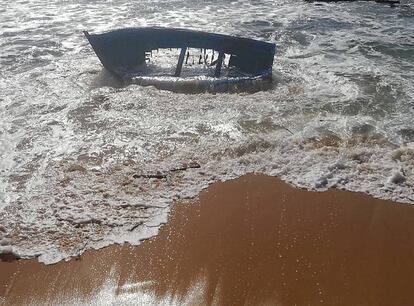17 migrants dead, 17 missing in worst tragedy in Strait of Gibraltar since 2009
A boat was shipwrecked near Barbate and another was found near the Spanish exclave city of Melilla with 13 bodies on board

He saw his brother drowning before his eyes and there was nothing he could do to save him. He does not know if his brother is one of the four migrants who have washed up dead on the coast of Barbate in Spain’s southern Cádiz province. He is one of 22 migrants from North Africa who survived when their small boat was overturned by rough seas in the Strait of Gibraltar, just meters from the coast of Cádiz.
The Civil Guard has opened an investigation to determine the identity of the boat’s captain
The tragedy took place on Monday, the same day that another 13 migrants lost their lives trying to reach Spain in a small boat near the Spanish exclave city of Melilla in North Africa, according to sources from Spain’s maritime rescue agency. Emergency services discovered the bodies on a boat carrying at least 40 other migrants. They tried to revive four of them but were unsuccessful. The cause of death is unknown but drowning appears to have been ruled out as initial investigations show that all the migrants were on board.
Maritime rescue personnel transported the victims to the port at Melilla on Monday afternoon and took the four dying migrants to a hospital. The search and rescue ship Guardamar Polimnia brought the survivors from the boat to the port, as well as the survivors from another vessel found close to the exclave city – a total of 80 migrants (75 men and five women).
While officials investigate the cause of death of the 13 migrants, the Civil Guard is trying to reconstruct what happened in Cádiz from the story of the man whose brother disappeared. Around 6am, the Civil Guard found 22 survivors in the beach Las Palmera in Los Caños de Meca, a small coastal town in Barbate. “They were soaking wet and so nervous that I couldn’t understand them,” says Luis Martín, head of the Civil Guard’s Cádiz Operations. A wooden boat was found stranded in the reef, together with the first victim from the tragedy, a 25-year-old man from North Africa.
Two search and rescue ships from the Special Group of Underwater Activities (GEAS), as well as a helicopter, were immediately sent out to find the at least 17 other people who were missing. A patrol also traveled over land in case the missing migrants had arrived at shore. The search effort was suspended Monday night and will begin again on Tuesday.
Hopefully they have reached land and are hiding
Civil Guard Commander Luis Martín
The 22 migrants are from North Africa and 13 say they are minors, according to sources from the investigation. Nervously they told officers that their boat capsized after two days at sea when they were just 200 meters from the coast. The strong swell and low tide pushed the boat to run aground in a reef, known in the area as “the slab.”
Rocks punctured the bottom of the boat and it sunk around 4am. On board “there would have been between 43 and 46 people, the information is confused,” says Martín. In the uncertainty of night, some of the shipwrecked migrants were able to follow the route and save themselves. “Others appear to have become disoriented,” says Martín.
The 22 rescued migrants believed that those who had disappeared had managed to reach land by foot but it was soon clear that this was not the case. The Civil Guard found three more bodies after 3pm and it is not known how many more could be found. “Those who were wearing life jackets are coming out. Those who didn’t could have sunk to the bottom and it will take days for them to appear,” says Martín.
The victims on first examination appear to be between 20 and 30 years old. An autopsy has yet to be performed and investigators have not ruled out that hypothermia as the cause of death.
Monday’s tragedy is the worst to have happened in the Strait of Gibraltar since June, 2009, when 10 migrants died in a shipwreck. The incident led to the arrest of six people for homicide and human trafficking.
Thirteen of the survivors say they are minors
The Civil Guard has now opened an investigation to determine the identity of the boat’s captain and the mafia members who, presumably, brought the migrants to Spain in an unseaworthy boat where “only half had life jackets,” says Martín.
Since Monday, large parts of the southern coast of Andalusia, from Málaga to Almería, have been on yellow alert for strong winds and sea conditions. It is these poor conditions that are encouraging some North African migrants to try their luck at sea. “They look for these poor conditions or alternative routes such as arriving at the Rota area [in Cádiz] to avoid being intercepted and then repatriated,” explains Martín.
The deaths of the 17 migrants come just four days after the 30th anniversary of the first recorded migrant death at sea. Since then, 6,714 people have died or disappeared in the Mediterranean Sea and Strait of Gibraltar, according to a report by Andalucía Acoge and the Foundation for a Cause. The Andalusian Human Rights Association (APDHA), however, puts the number as high as 8,000 people. Both associations have described the Strait of Gibraltar as “a big common grave.”
Monday’s tragedy may add yet more victims to the body count. “Hopefully they have reached land and are hiding, as has happened on other occasions. But we don’t know,” says Martín.
English version by Melissa Kitson.
Tu suscripción se está usando en otro dispositivo
¿Quieres añadir otro usuario a tu suscripción?
Si continúas leyendo en este dispositivo, no se podrá leer en el otro.
FlechaTu suscripción se está usando en otro dispositivo y solo puedes acceder a EL PAÍS desde un dispositivo a la vez.
Si quieres compartir tu cuenta, cambia tu suscripción a la modalidad Premium, así podrás añadir otro usuario. Cada uno accederá con su propia cuenta de email, lo que os permitirá personalizar vuestra experiencia en EL PAÍS.
¿Tienes una suscripción de empresa? Accede aquí para contratar más cuentas.
En el caso de no saber quién está usando tu cuenta, te recomendamos cambiar tu contraseña aquí.
Si decides continuar compartiendo tu cuenta, este mensaje se mostrará en tu dispositivo y en el de la otra persona que está usando tu cuenta de forma indefinida, afectando a tu experiencia de lectura. Puedes consultar aquí los términos y condiciones de la suscripción digital.









































